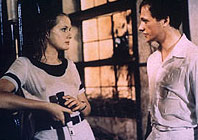|
|
|
|
The
Garden of the Finzi-Continis
|
 |
|
Is any old film that happens to be granted a re-release an instant, unquestionable masterpiece? Vittorio De Sica's The Garden of the Finzi-Continis raises this question with particular force. Its source material (Giorgio Bassani's novel) and subject matter (Italian Jews slowly tweaking to the coming Fascist oppression of their existences) are undoubtedly compelling. But, as a movie, it is pretty poor stuff. The Garden of the Finzi-Continis marked an international comeback for a director who had never stopped working, but whose star had fallen since the days of neorealist masterpieces like Umberto D (1952). But, in its day, it compellingly spoke to a '70s audience that was appreciating a resurgence of such political and historical themes in arthouse cinema. This is a story in which a tragic punchline is held off as long as possible, only intimated as a dark shadow while the characters obliviously enjoy their last reveries. The beautiful young things who gather in the seemingly protected ghetto of a high-bourgeois garden are caught in an agonising daisy-chain of mismatched desires. On this level the film anticipates the finer drama of André Téchiné's Wild Reeds (1994): no one, straight or gay, is loved by the person they really want. De Sica's films, including some of the best ones (such as Bicycle Thieves, 1947), have not aged well. As a director he was never truly in the league of Visconti or Fellini, and one wonders today why he was ever considered a master of any sort. Stylistically, The Garden of the Finzi-Continis is something of an eyesore – with its relentlessly saturated colour, clumsy zoom lens work and listless staging. The film comes alive only in those moments when De Sica rivets his camera in close-up on his glamorous young stars (Dominique Sanda and Helmut Berger especially), in order to observe the furtive darting of their soulfully expressive eyes. Buried somewhere in this shapeless, sentimental movie is a keen, touching parable about the interrelation of personal and political, or private and public dramas. The encroaching social tragedy renders the romantic palpitations of the characters by turns petty, desperate, absurd and poignant. As history marches roughshod over the Jews, De Sica suggests the need for forgiveness and a reconciliation of all internal feuds. However, the main problem with The Garden of the Finzi-Continis is that it keeps its focus on neither the personal nor political realm. Both the intimate story of youthful desire and the larger canvas of historic evil are short-changed by De Sica's dithering. The film remains affecting, almost despite itself, but as a masterpiece it is highly overrated. © Adrian Martin March 1998 |
![]()